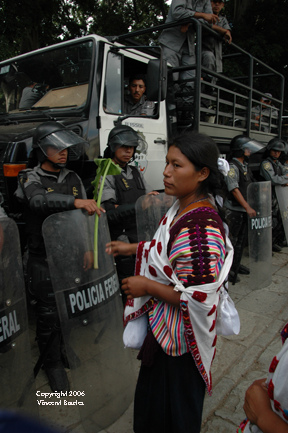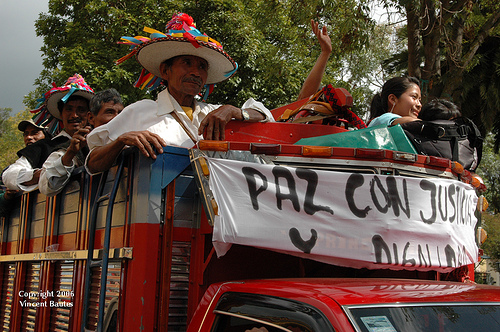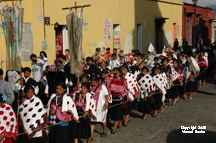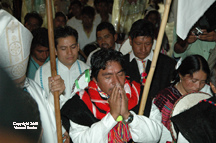Chicago Indymedia : http://chicago.indymedia.org/archive
News :: International Relations
Chiapan Pacifist Group is First to Lead Peace Caravan into Oaxaca City
Photos by Vincent Bautes

A member of Las Abejas hands a white lily to police in riot gear.



The shady plazas that flank Oaxaca's imposing cathedral used to be full of color: the jewel-toned colonial buildings, the crimson tunics of indigenous Copala Triqui women, the extravagant tropical flowers, and the bright weavings for sale.
Now, it is a sea of gray. Steel police vehicles armed with water cannons, security cameras and plows block many of the streets in the city center. Thousands of uniformed federal police forces (PFP) fill the square. Some stand at attention behind shields, while others send text messages, lick popsicles, and eat tacos at makeshift comedores.
The Cathedral of Oaxaca was the last stop for a peace caravan led by Las Abejas, a Catholic pacifist group made up of indigenous people from 48 communities in Los Altos, the Chiapan highlands. Las Abejas is well known in Southern Mexico, thanks to a 1997 massacre that took the lives of 45 Las Abejas members, including many women and children. Group members were killed when paramilitary troops stormed their church in Acteal as they prayed for peace in Chiapas.
Last week Las Abejas and others took their prayers to Oaxaca. Over 240 people, including 100 men and 100 women from Las Abejas, representatives from social organizations in San Cristóbal de las Casas, and university students took part in the caravan that left Chiapas on November 9.
Las Abejas arrived home this week, after days of fasting and prayer, having delivering messages of peace and over two and a half tons of food, drinking water, and medicine to Oaxaca. Theirs was the first demonstration allowed in the historic plaza since it was occupied on October 29 by the Federal Preventative Police (PFP), sent by President Vicente Fox with the stated purpose of restoring order after three people, Emilio Alonso Fabián, Esteba Ruiz, and American journalist Bradley Will, were killed when gunmen identified as local police officers and municipal officials opened fire on a group of protesters.
When they entered the central plaza, the PFP broke up an encampment of striking teachers and supporters that had occupied the plaza for five months. The BBC reported that an estimated 400 people were wounded and 17 died since July.
Caravan leaders negotiated with the PFP and were finally permitted to occupy the area in front of the Cathedral, where they lit candles, said peace prayers, and performed sacred dances.
"We leave a legacy to our children. It is our responsibility here, in this moment, to weave a new social fabric, and to create peace with justice and dignity that is true and lasting," said José Vázquez Gutiérrez, spokesman for the group, as he stood in front of the cathedral.
Las Abejas presented a homemade peace flag to members of the community. Women, some with babies on their backs, gave white lilies to the police who stood shoulder to shoulder in riot gear surrounding the group and photographing the crowd.
"We don't want any more dead. War only creates more violence, death, hunger, pain, and sadness," said Vázquez Gutiérrez. He urged the federal and state governments to find a peaceful solution to the conflict, which began in May when 70,000 teachers struck for higher wages. Since then, it has grown into a broad movement of teachers, unions, students, human rights organizations, and concerned citizens calling themselves the Popular Assembly of the Oaxacan People, (APPO.)
Among the APPO's demands are the end of political repression, the live return of disappeared people, the release of political prisoners, and the ouster of Oaxaca's governor, Ulises Ruiz of the Institutional Revolutionary Party (PRI), who many claim is guilty of abusing power and repressing the people of Oaxaca. In late October, Mexico's congress signed a resolution asking for Ruiz's resignation.
he APPO formed after police attacked and dislodged an encampment of 30,000 people, mostly teachers and their families, at dawn on June 14. The APPO formed after police attacked and dislodged an encampment of 30,000 people, mostly teachers and their families, at dawn on June 14 who had been occupying the city center since the strike began. According to the Oaxacan Human Rights Network, police entered without giving the people in the encampment the chance to and used assault weapons, attack dogs, and detonated tear gas bombs for nearly five hours continuously during the take.
In response to the violence and repression in Oaxaca, the women of Las Abejas proposed a caravan, said Ernestine Pérez Pérez, part of a team of members making a video of the caravan. "We believe that the government must respect the will of the people," she said.
The situation in Oaxaca remains tense and many claim that the presence of federal troops is only heightening the potential for greater violence and social unrest.
"The displacement of the teachers was the straw that broke the camel's back," said Margarita, a housewife and APPO supporter who asked that only her first name be used, as she awaited the arrival of Las Abejas outside the Templo de la Soledad last Friday night.
When they arrived, tears rolled down Margarita's face as she watched Las Abejas descend from the 22 pickup trucks that brought them from Chiapas, then walk slowly to the church playing violins, flutes, drums, and wooden harps.
"We need a lot of moral support right now," she said, "physical support, too, but moral support more than anything."
Margarita agrees that the situation in Oaxaca had deteriorated since the Federal Preventative Police Force (PFP) entered the city center. "Their presence isn't needed or wanted. On the contrary, we feel more repressed than ever, even more threatened," said Margarita.
The next morning, Las Abejas visited the APPO's Constitutional Congress, where over a thousand delegates from throughout the state gathered to select leaders and define goals. Las Abejas delivered humanitarian aid and a message of solidarity to the assembly. During a lunch break, APPO members filled the street outside the Hotel del Magisterio, sending up occasional cheers as sympathetic neighbors brought pots of food and jugs of agua de horchata from their kitchens to feed the crowd.
In the thick of the throng was primary school teacher Erangelio Mendoza González, who says he was detained and tortured for three months and before his release on October 30. Mendoza González said that he owes his freedom to the people all over Mexico and the world that demanded his release. "What Las Abejas represents, with all of their peaceful marches and ancient customs, is a very important part of the history of our people. Their presence is very important. It is beautiful to see them here," he said.
Now, it is a sea of gray. Steel police vehicles armed with water cannons, security cameras and plows block many of the streets in the city center. Thousands of uniformed federal police forces (PFP) fill the square. Some stand at attention behind shields, while others send text messages, lick popsicles, and eat tacos at makeshift comedores.
The Cathedral of Oaxaca was the last stop for a peace caravan led by Las Abejas, a Catholic pacifist group made up of indigenous people from 48 communities in Los Altos, the Chiapan highlands. Las Abejas is well known in Southern Mexico, thanks to a 1997 massacre that took the lives of 45 Las Abejas members, including many women and children. Group members were killed when paramilitary troops stormed their church in Acteal as they prayed for peace in Chiapas.
Last week Las Abejas and others took their prayers to Oaxaca. Over 240 people, including 100 men and 100 women from Las Abejas, representatives from social organizations in San Cristóbal de las Casas, and university students took part in the caravan that left Chiapas on November 9.
Las Abejas arrived home this week, after days of fasting and prayer, having delivering messages of peace and over two and a half tons of food, drinking water, and medicine to Oaxaca. Theirs was the first demonstration allowed in the historic plaza since it was occupied on October 29 by the Federal Preventative Police (PFP), sent by President Vicente Fox with the stated purpose of restoring order after three people, Emilio Alonso Fabián, Esteba Ruiz, and American journalist Bradley Will, were killed when gunmen identified as local police officers and municipal officials opened fire on a group of protesters.
When they entered the central plaza, the PFP broke up an encampment of striking teachers and supporters that had occupied the plaza for five months. The BBC reported that an estimated 400 people were wounded and 17 died since July.
Caravan leaders negotiated with the PFP and were finally permitted to occupy the area in front of the Cathedral, where they lit candles, said peace prayers, and performed sacred dances.
"We leave a legacy to our children. It is our responsibility here, in this moment, to weave a new social fabric, and to create peace with justice and dignity that is true and lasting," said José Vázquez Gutiérrez, spokesman for the group, as he stood in front of the cathedral.
Las Abejas presented a homemade peace flag to members of the community. Women, some with babies on their backs, gave white lilies to the police who stood shoulder to shoulder in riot gear surrounding the group and photographing the crowd.
"We don't want any more dead. War only creates more violence, death, hunger, pain, and sadness," said Vázquez Gutiérrez. He urged the federal and state governments to find a peaceful solution to the conflict, which began in May when 70,000 teachers struck for higher wages. Since then, it has grown into a broad movement of teachers, unions, students, human rights organizations, and concerned citizens calling themselves the Popular Assembly of the Oaxacan People, (APPO.)
Among the APPO's demands are the end of political repression, the live return of disappeared people, the release of political prisoners, and the ouster of Oaxaca's governor, Ulises Ruiz of the Institutional Revolutionary Party (PRI), who many claim is guilty of abusing power and repressing the people of Oaxaca. In late October, Mexico's congress signed a resolution asking for Ruiz's resignation.
he APPO formed after police attacked and dislodged an encampment of 30,000 people, mostly teachers and their families, at dawn on June 14. The APPO formed after police attacked and dislodged an encampment of 30,000 people, mostly teachers and their families, at dawn on June 14 who had been occupying the city center since the strike began. According to the Oaxacan Human Rights Network, police entered without giving the people in the encampment the chance to and used assault weapons, attack dogs, and detonated tear gas bombs for nearly five hours continuously during the take.
In response to the violence and repression in Oaxaca, the women of Las Abejas proposed a caravan, said Ernestine Pérez Pérez, part of a team of members making a video of the caravan. "We believe that the government must respect the will of the people," she said.
The situation in Oaxaca remains tense and many claim that the presence of federal troops is only heightening the potential for greater violence and social unrest.
"The displacement of the teachers was the straw that broke the camel's back," said Margarita, a housewife and APPO supporter who asked that only her first name be used, as she awaited the arrival of Las Abejas outside the Templo de la Soledad last Friday night.
When they arrived, tears rolled down Margarita's face as she watched Las Abejas descend from the 22 pickup trucks that brought them from Chiapas, then walk slowly to the church playing violins, flutes, drums, and wooden harps.
"We need a lot of moral support right now," she said, "physical support, too, but moral support more than anything."
Margarita agrees that the situation in Oaxaca had deteriorated since the Federal Preventative Police Force (PFP) entered the city center. "Their presence isn't needed or wanted. On the contrary, we feel more repressed than ever, even more threatened," said Margarita.
The next morning, Las Abejas visited the APPO's Constitutional Congress, where over a thousand delegates from throughout the state gathered to select leaders and define goals. Las Abejas delivered humanitarian aid and a message of solidarity to the assembly. During a lunch break, APPO members filled the street outside the Hotel del Magisterio, sending up occasional cheers as sympathetic neighbors brought pots of food and jugs of agua de horchata from their kitchens to feed the crowd.
In the thick of the throng was primary school teacher Erangelio Mendoza González, who says he was detained and tortured for three months and before his release on October 30. Mendoza González said that he owes his freedom to the people all over Mexico and the world that demanded his release. "What Las Abejas represents, with all of their peaceful marches and ancient customs, is a very important part of the history of our people. Their presence is very important. It is beautiful to see them here," he said.
Information Library
Views
Search
Account Login
Media Centers
- worcester
- western mass
- vermont
- urbana-champaign
- tennessee
- tampa bay
- seattle
- sarasota
- santa cruz, ca
- santa barbara
- san francisco bay area
- san francisco
- san diego
- saint louis
- rogue valley
- rochester
- richmond
- portland
- pittsburgh
- philadelphia
- oklahoma
- nyc
- north texas
- north carolina
- new orleans
- new mexico
- new hampshire
- minneapolis/st. paul
- milwaukee
- michigan
- miami
- maine
- madison
- la
- kansas city
- hudson mohawk
- houston
- hawaii
- dc
- columbus
- colorado
- cleveland
- chicago
- charlottesville
- buffalo
- boston
- binghamton
- big muddy
- baltimore
- austin indymedia
- austin
- atlanta
- asheville
- arkansas
- arizona
- valencia
- united kingdom
- ukraine
- toulouse
- toscana
- torun
- switzerland
- sverige
- scotland
- sardegna
- russia
- romania
- roma
- portugal
- poland
- piemonte
- patras
- paris/Île-de-france
- oost-vlaanderen
- nottingham
- norway
- northern england
- nice
- netherlands
- napoli
- nantes
- marseille
- malta
- madrid
- london
- lombardia
- linksunten
- lille
- liguria
- liege
- la plana
- italy
- istanbul
- ireland
- hungary
- grenoble
- germany
- galiza
- euskal herria
- estrecho / madiaq
- emilia-romagna
- cyprus
- croatia
- calabria
- bulgaria
- brussels
- bristol
- belgrade
- belgium
- belarus
- barcelona
- austria
- athens
- armenia
- antwerpen
- andorra
- alacant
- abruzzo
This site made manifest by dadaIMC software



